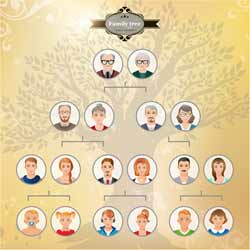Become a Professional Genealogist
Can you trace your family tree? Who are your ancestors? Were they famous? Where did they come from? If you want to know, hire a genealogist.
A genealogist is a professional researcher who compiles data about ancestry. They create charts, maps, and reports that trace a person’s genealogy, or family history. Their research and information tells a historic and genetic story of both people and societies.

Through the research of a genealogist you can learn who you are and where you come from.
Everyone has 2 parents, 4 grandparents, 16 great grandparents, and our family tree expands exponentially from there. The branches of a family tree spread across history and geographical regions. They connect people on the most basic level. No matter who you are, you are part of someone’s family tree. It’s a fascinating subject and that is why genealogy is one of the United State’s most popular hobbies.
A genealogist may be asked to find a long lost relative, search for a possible heir to settle a dispute over an estate, or seek proof for someone who wants to join a lineage society. Typically a genealogist works for the government, asset recovery groups, research organizations, or is self-employed. The job begins with a name and a place of birth and through meticulous research the ancestral story of that person is unraveled. As historical detectives, genealogists explore family trees forwards, backwards, and sideways.
Every genealogical project is different. A search for a marriage record may take an hour, but compiling a multi-generational family tree may take hundreds of hours. The time is spent researching passenger manifests, personal letters, photographs, birth certificates, death records, marriage licenses, wills, tax documents, census data, immigration records, biographies, and handwritten documents. The genealogist must track down these documents from libraries, state archives, churches, offices of public record, genealogical societies, gravesites, and individuals.
It is a time consuming task to find accurate evidence and proof of relationships. There is lots of genealogical information available online, but there is no way to verify who compiled that info. Once the basic information is found, it must be compiled into a written report with charts, names, dates, locations, and other pertinent information.
Most people begin a career in genealogy because they are curious about their own family tree. To be a genealogist there are no educational requirements. To learn the ropes, attend workshops and conferences or join local and national genealogical societies. To become a professional become certified.
The Board for Certification of Genealogists offers six different certification levels including Certified Genealogist, Certified Genealogical Record Specialist, Certified American Lineage Specialist, Certified American Indian Lineage Specialist, Certified Genealogical Instructor, and Certified Genealogical Lecturer.
The board also established research standards that ensure genealogists compile accurate information. Certification allows genealogists to command a higher fee for their work.
Many genealogists become members of the Association of Professional Genealogists to expand their resource pool and to specialize in certain genealogical niches. A genealogist may focus on research about time periods, ethnic groups, religion, records, heirs, adoptions, military, or geographical areas. The APG offers membership to researchers, columnists, writers, archivists, geneticists, librarians, and other people involved in the genealogical industry.
A genealogist can work full time or part time. The day is spent researching, lecturing, writing, and working with clients on different projects. Depending on niche and expertise, genealogists make $10 to $25 per hour or $24,000 to $51,000 per year.
If you’ve ever wondered about your roots, consider a career as a genealogist. It’s thrilling to find out where people really come from.
Quick Facts About the Genealogy Profession
Job Title: Genealogists
Office: Libraries, Courthouses, Archives
Description: Research people’s family history and compile information into reports
Certifications/Education: No formal education required. Board of Certification of Genealogists Certification recommended
Necessary Skills: Research skills, Accuracy, Lots of reading
Potential Employers: Self-employed, government, asset recovery groups, research organizations
Pay: $ 10 to $25 per hour or $24,000 to $51,000 per year
Helpful Genealogists Employment Links:
Search Genealogist Jobs on JobMonkey
National Genealogical Society
Genealogical Speakers Guild
Association of Professional Genealogists
Board for Certification of Genealogists
Family History Library
Federation of Genealogical Societies
Genealogy.com
International Commission for the Accreditation of Professional Genealogists


 Teach English in Asia
Teach English in Asia  Cruise Ship Jobs
Cruise Ship Jobs  Alaska Fishing Industry Jobs
Alaska Fishing Industry Jobs  Sharing Economy / Gig Economy
Sharing Economy / Gig Economy